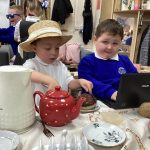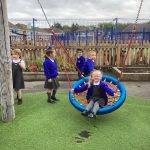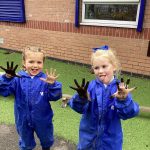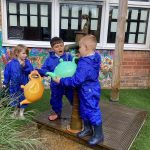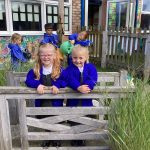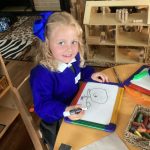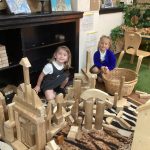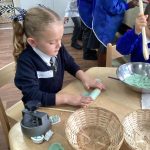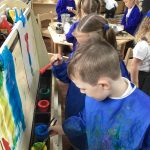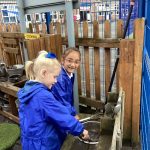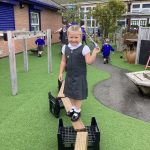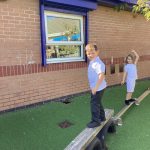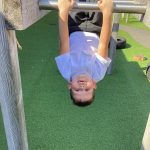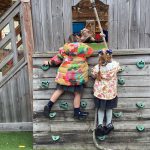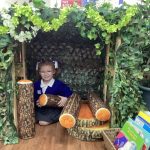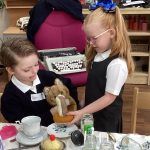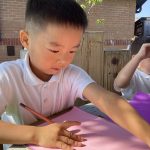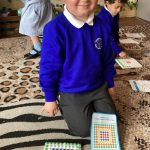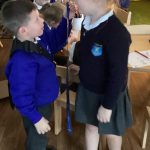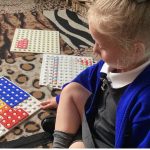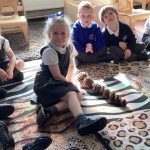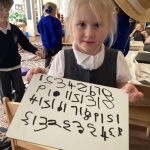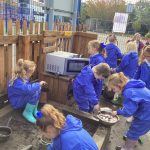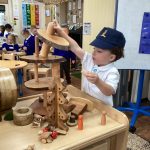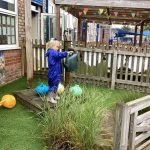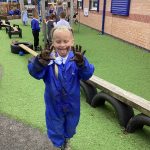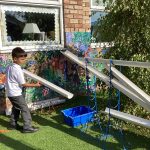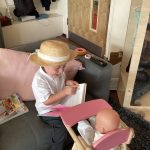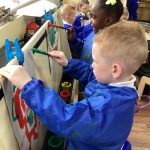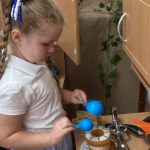EYFS
Welcome to our Early Years Foundation Stage – get ready to learn lots and have fun whilst you do it!
As stated in the statutory framework for early years, we believe that every child deserves the best possible start in life and the support that enables them to fulfil their potential. Children develop quickly in the early years and a child’s experiences between birth and age five have a major impact on their future life chances. A secure, safe and happy childhood is important in its own right. Good parenting and high quality early learning together provide the foundation children need to make the most of their abilities and talents as they grow up. Here at Leamington we aim to ensure that children learn and develop well and are kept healthy and safe. Our curriculum is broken into 7 areas of learning. All areas of learning and development are important and inter-connected. These areas are particularly crucial for igniting children’s curiosity and enthusiasm for learning, and for building their capacity to learn, form relationships and thrive. Click the links to see more of our Nursery – Nursery and to see more of our Reception – Reception.
At Leamington we have worked closely with our curriculum lead in order to develop our own immersive curriculum. This begins when children join our nursery and continues until the end of Year 6. We aim to emotionally connect the pupils to their curriculum to increase motivation, interest and attitude to learning. We want our children to love to learn and this journey starts in our early years. We do this by immersing the children into every aspect of our curriculum, we step into magic story world where anything is possible- aspirations are high! We help solve mysteries, become superheroes, fairy tale characters and much more. We want all learners to exceed their potential academically, socially and emotionally thus gaining the necessary skills, knowledge and attributes to be successful in the next stage of their learning. Children also use elements of Pie Corbett’s model to add actions enabling them to orally retell stories and even compose their own versions. We want to provide children with real life experiences allowing them to apply the skills we teach “for real”.
As a team we have used Development Matters to help us design an effective curriculum, building on the strengths and meeting the needs of our children. We have also included some statements from Birth to Five that we feel are integral to the development of our children. We take a flexible approach and try to plan from the children’s interests and needs, no 2 years are the same as we start at the children’s level and build on their prior knowledge and skills. Our curriculum is child centred following the interests and fascinations of the children in the current year group. We are passionate about children leading and engrossing themselves in their learning. Through our knowledge of each child and formative assessments we plan immersive activities that will move the children’s learning forward. This may involve following a “topic” from our curriculum maps/knowledge organisers. Here we take advantage of cross curricular links in order to combine transferable skills and develop a wide-ranging vocabulary which underpins the children’s learning. Planning may also include following individual children’s interests and making the most of those focused moments where the teaching and learning can be maximised in a one to one way with teacher and child. Each year creates its own unique blend of whole class, guided, adult directed play and child-initiated play activities dependant on the nature and needs of the class of individuals.
Children in EYFS learn by playing and exploring, being active and thinking critically and creatively and this takes place both indoors and in our outdoor area. Our outdoor area is open all year round and in all but the most challenging weather conditions. By doing so we can continue to immerse the children in experiences they can’t have sitting in the class. Children make their own decisions about where they learn best and teachers ensure that there are opportunities for all areas of learning both inside and outside.
PSED
We are always learning from one another and each week we have time to reflect during Wellbeing time. We enjoy meditating, yoga and peer massage. We follow the Key person approach both in Nursery and Reception which helps our children to settle which helps our children to settle, form secure attachments and learn. Children are taught how to work as a team, take turns, form relationships and friendships. For some children this comes naturally. Other children need extra support and planned interventions. We welcome our children into a warm and loving environment and they love to be in school. Staff make mistakes and the children know that this is ok, in turn they are confident and resilient. All children are treated as individuals, there is no one size fits all at Leamington.
By the time children leave Reception the expectations are that:
- Children will show an understanding of their own feelings and those of others, and begin to regulate their behaviour accordingly. Set and work towards simple goals, being able to wait for what they want and control their immediate impulses when appropriate. Give focused attention to what the teacher says, responding appropriately even when engaged in activity, and show an ability to follow instructions involving several ideas or actions.
- We want children to be confident to try new activities and show independence, resilience and preserve in the face of challenge. Children will understand and be able to explain the reasons for rules, know right from wrong and try to behave accordingly. Manage their own basic hygiene and personal needs, including dressing, going to the toilet and understanding the importance of healthy food choices.
- Children will learn to work and play cooperatively and take turns with others. Form positive attachments to adults and friendships with peers. Show sensitivity to their own and to others’ needs.
Physical Development
How lucky are we?
Our resources both inside and out build on many skills supporting our gross and fine motor development. Children develop core muscles and upper body strength by using our water pump, climbing wall and monkey bars. They show balance and coordination on the beam and love to go digging in the mud kitchen and exploring in our sand den. As well as this we continue to challenge and develop the children’s fine motor abilities. We do this through planned and child led opportunities for dough dancing, threading, construction and creative play. In Reception we deliver exciting weekly P.E lessons, building on the skills we require to support us to write and navigate around safely, as well as teaching us good habits to live a healthy lifestyle. We love to mark make and write and children do this as part of their play in all areas of the provision. We help our children on their road to writing by developing gross motor skills, bilateral integration – crossing the mid line, fine motor control, and developing dexterity.
By the end of Reception children should:
- Negotiate space and obstacles safely, with consideration for themselves and others. Demonstrate strength, balance and coordination when playing. Move energetically, such as running, jumping, dancing, hopping, skipping and climbing.
- Hold a pencil effectively in preparation for fluent writing – using the tripod grip in almost all cases. Use a range of small tools, including scissors, paint brushes and cutlery. Begin to show accuracy and care when drawing.
Communication and Language and Literacy
Story dust, story dust really is a must,
Sprinkle on and we’ll be gone to magic story world!
We are so dramatic in Foundation stage! We take a trip to magic story world most days, where the magic of stories comes alive. We learn through amazing theatrical hooks and are visited by many characters throughout the year. It gives us a reason to build on our speaking and listening skills and gives us purpose to our writing and love of reading. We are always trying to develop our speaking and listening skills because we know that this will also help all our learning across the curriculum. We always have something exciting to talk about and our children make amazing detectives and work very closely with our very own PC Tramolinio to catch bad guys such as Dylan the Villain and the Big Bad Wolf. We want all of our children to love books and become confident readers. We start Read, Write Inc when the children are ready in Nursery and carry this on daily through Reception. Fred helps our children to hear the sounds in words and we help him to blend them together.
In Nursery, we use the screening tool Wellcomm as a vital assessment technique for finding out the level of understanding that our children are currently at when starting our Nursery.
WellComm is a Speech and Language Toolkit for screening and intervention in the Early Years. It plays a crucial role in identifying children with potential language difficulties and offers a range of customised intervention activities to help support their language development.
Children are screened every 3 months by a trained member of our team and are scored based on a green, amber or red system. A red score considers a referral to a specialist service for further advice/assessment, an amber score results in extra support and intervention, a child who scores green requires no further intervention and progresses to the next level.
WellComm interventions are based around the ‘Big Book of Ideas’, which provides focused teaching and intervention activities to meet the individual needs of each child. Through The Big Book of Ideas, WellComm provides a large number of bespoke, fun and practical intervention activities for children across the entire age range, which are designed to stimulate and improve the speech and language skills of all children at all levels.
By the end of Reception, the expectations are that:
- Children can demonstrate understanding of what has been read to them by retelling stories and narratives using their own words and recently introduced vocabulary. Anticipate where appropriate key events in stories. Use and understand recently introduced vocabulary during discussions about stories, non-fiction, rhymes and poems and during role-play.
- Children should be able to say a sound for each letter in the alphabet and at least 10 digraphs. Read words consistent with their phonic knowledge by sound-blending. Read aloud simple sentences and books that are consistent with their phonic knowledge, including some common exception words.
- Children will be expected to write recognisable letters, most of which are correctly formed. Spell words by identifying sounds in them and representing the sounds with a letter or letters. Write simple phrases and sentences that can be read by others.
Mathematics
We are really inquisitive and enjoy learning practically through hands on experiences that provide us with exciting opportunities to use a range of skills we are taught, to become mathematicians. We want our children to use maths in real life situations and become problem solvers. We immerse the children in Maths throughout their play. We do this in so many fun ways. Through baking we measure, we learn about money by playing shop, we share equally at snack time, develop an understanding about symmetry in the blocks.
By the end of Reception, it is expected that:
- Children will have a deep understanding of number to 10, including the composition of each number. Children will be able to subitise (recognise quantities without counting) up to 5. Automatically recall (without reference to rhymes, counting or other aids) number bonds up to 5 (including subtraction facts) and some number bonds to 10, including double facts.
- Children should be able to verbally count beyond 20, recognising the pattern of the counting system. Compare quantities up to 10 in different contexts, recognising when one quantity is greater than, less than or the same as the other quantity. Explore and represent patterns within numbers up to 10, including evens and odds, double facts and how quantities can be distributed equally.
Understanding of the World
We all have our own story to share and recognise that everyone is unique. Our world is a precious place and we know it is up to us to look after it. By the end of Reception we want our children to know the importance of caring for our planet and understand how important it is for us to recycle. We become geographers by getting to know our local area and our school. We love following maps to find any hidden treasures.
We celebrate diversity, different cultures and traditions talking about our own experience and how they are similar and different to others. Our children are amazing and embrace differences.
We become super scientists by exploring and investigating in our provision. Humpty Dumpty couldn’t thank us enough when we found the best material to stop him breaking his shell. We talk about growth and change, looking at ourselves, plants, animals such as chicks, ducks and butterflies. The children are amazed to see the changes happen before their eyes.
We talk about our own history and love to look back at our learning journey, talking about how we have changed, grown up, what we can do now that we couldn’t do then.
By the end of Reception, it is expected that:
- Children can talk about the lives of the people around them and their roles in society. Know some similarities and differences between things in the past and now, drawing on their experiences and what has been read in class. Understand the past through settings, characters and events encountered in books read in class and storytelling.
- Children should be able to describe their immediate environment using knowledge from observation, discussion, stories, non-fiction texts and maps. Know some similarities and differences between different religious and cultural communities in this country, drawing on their experiences and what has been read in class. Explain some similarities and differences between life in this country and life in other countries, drawing on knowledge from stories, non-fiction texts and when appropriate maps.
- Children can explore the natural world around them, making observations and drawing pictures of animals and plants. Know some similarities and differences between the natural world around them and contrasting environments, drawing on their experiences and what has been read in class. Understand some important processes and changes in the natural world around them, including the seasons and changing states of matter.
EAD
Our mind is like a little star shining with ideas.
We use our imagination each day to create another world. We do this so often in all our areas of provision including block play, crates, role play and even in our writing! We want our children to be able to express themselves appropriately and show them how to do this through drawing, painting, printing, collage, construction, music, song and dance.
The expectation by the end of Reception is:
- Children will safely use and explore a variety of materials, tools and techniques, experimenting with colour, design, texture, form and function. Share their creations, explaining the process they have used. Make use of props and materials when role playing characters in narratives and stories.
- Children will be able to invent, adapt and recount narratives and stories with peers and their teacher. Sing a range of well-known nursery rhymes and songs. Perform songs, rhymes, poems and stories with others, and when appropriate try to move in time with music.
Reception Baseline assessment
All Reception children will be participating in the reception baseline assessment (RBA) within the first 6 weeks of starting reception. The purpose of the assessment is to provide the starting point for a progress measure that will help parents understand how well schools support their pupils to progress between reception and year 6. For more information please visit https://www.gov.uk/government/publications/reception-baseline-assessment-information-for-parents/reception-baseline-assessment-information-for-parents
In the final term of the Reception year, teachers complete an assessment known as the EYFS Profile for each child. The Profile is a quick check of your child’s learning, which will be shared with you.
Important documents:
